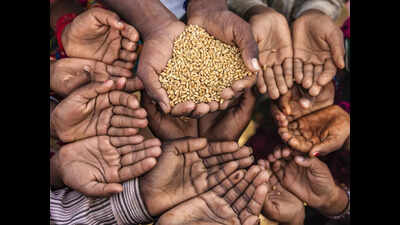ARTICLE AD BOX

Patna: Even as one-third families of Bihar live below poverty line (as per Bihar Caste Survey, 2023), more than 70 lakh tonnes of foodgrains produced in the state are wasted every year.
This can well feed the entire population of Telangana or Kerala, which is about 3.5 crore, according to NSSO statistics.On the eve of World Food Day, it is even more painful to note that a huge amount of food grains is being wasted in a county that ranks 105th out of 127 countries in 2024 Global Hunger Index, with a score of 27.3 on a scale of 50 that places India in the "serious” category. The index is based on four indicators: undernourishment, child wasting, child stunting and child mortality.With more than 50% of the population identified as “multidimensionally poor”, a measure which takes into account health, education and standard of living, Bihar also has the highest number of malnourished people.Highlighting the theme of this year’s World Food Day, “Hand in hand for better foods and a better future”, social scientists emphasise the need for concerted efforts at global level to ensure regular access to nutritious food for lakhs of people who fail to get a regular diet.
Aditya Raj, a senior teacher of humanities and social sciences at IIT-Patna, said that said wastage of food grains is mainly due to poor governance. “Tonnes of food grains are allowed to rot in godowns due to defective supply chain. A huge quantity of fruits and vegetables grown in Bihar are allowed to rot in absence of sufficient number of cold storages. As many as 12 districts have reportedly no cold storage facilities at all,” he said.Raj further said that food suitable for human consumption is wasted in large quantities among medium- and high-income group people. “They order large amount of food in hotels and social functions like weddings, and consume only a part of it. The rest unconsumed food is wasted,” he said.Sudhanshu Kumar, an economist associated with Bihar Institute of Public Finance and Policy, said that reducing wastage not only enhances food security but also benefits the environment.
Every kilogram of food saved conserves precious resources like land, water and energy, while also reducing greenhouse gas emissions. “By minimising waste, we ease the pressure on our ecosystems and contribute to building resilience against climate change,” he said, adding households, communities and govt can make a significant difference through small but meaningful actions — planning meals wisely, avoiding over-purchasing, utilising leftovers and redistributing surplus food among those in need.

 1 day ago
6
1 day ago
6









 English (US) ·
English (US) ·